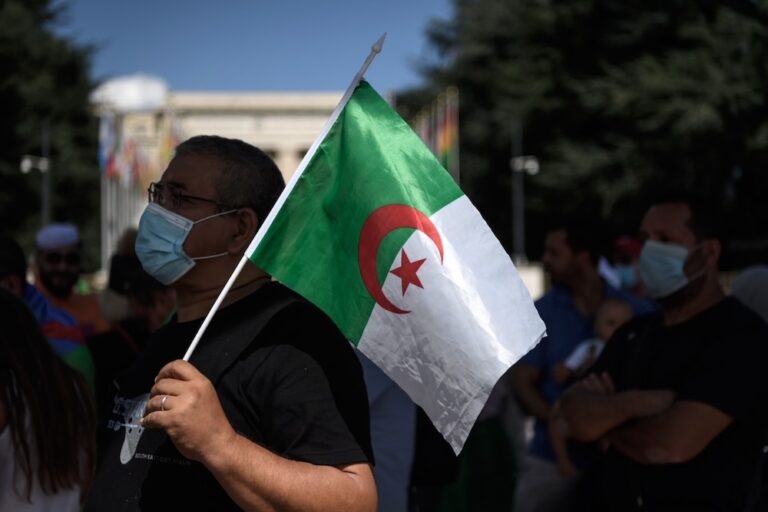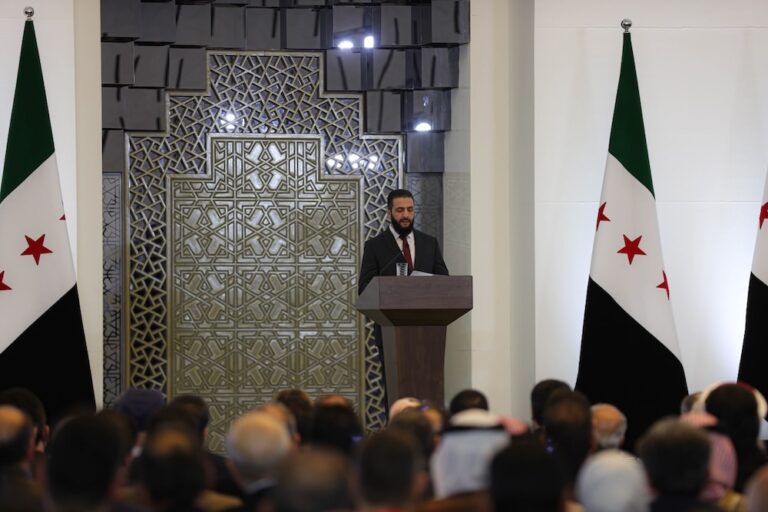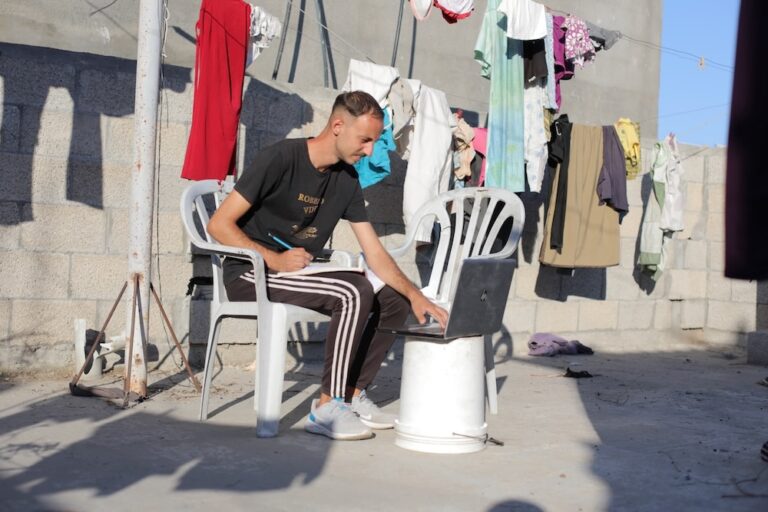(IAPA/IFEX) – The following is a 19 March 2007 IASPA press release: IAPA conclusions on press freedom in the Americas MIAMI, Florida (March 19, 2007) – Murders, threats, criminal charges and lawsuits filed to which independent journalists and news media are subjected, together with the arbitrary placement of official advertising to punish or reward, are […]
(IAPA/IFEX) – The following is a 19 March 2007 IASPA press release:
IAPA conclusions on press freedom in the Americas
MIAMI, Florida (March 19, 2007) – Murders, threats, criminal charges and lawsuits filed to which independent journalists and news media are subjected, together with the arbitrary placement of official advertising to punish or reward, are some of the major issues highlighted in the conclusions reached by the Inter American Press Association (IAPA) today on winding up the organization’s Midyear Meeting in Cartagena, Colombia, in which it reviewed the state of freedom of the press in the Americas.
Following is the full text of the conclusions:
CONCLUSIONS Resolution of the Midyear Meeting
Cartagena de Indias, Colombia, March 16 – 19, 2007
Six journalists were killed and two disappeared in the last six months in Mexico, while another was killed in Haiti. These were the most violent acts against the media in the Americas, where freedom of the press has deteriorated considerably in the last six months.
The assassinated journalists were all victims of drug and gang wars, reflecting how throughout the region organized crime was a bigger physical threat to journalists than old-fashioned political differences. There were nearly two dozen more cases of reported death threats in Guatemala, Honduras, Colombia, Ecuador, Paraguay, Dominican Republic, Uruguay, Peru, Venezuela, and Brazil, some related to the reporting of corruption.
More characteristic threats to press freedom involved government pressure. Cuba and Venezuela stand out. Venezuelan President Hugo Chávez continues to imitate the Latin American dictatorships of the 1940s.
President Chávez threatens to shut down Venezuela’s leading TV network, Radio Caracas Televisión, after repeatedly announcing that its broadcast license would not be renewed because of its independent editorial line. An administrative tribunal later assessed the network a fine of 1.5 billion bolivares (700,000 U.S. dollars), and President Chávez said the government planned to buy the station, and publicly threatened to expropriate it if a price could not be agreed upon. The government said its actions were based on complaints about the station’s news coverage.
Unfortunately, the judicial branch in Venezuela is not independent, and this undermines the rule of law and the ability to wage a legal defense of the rights of media outlets and journalists. The government, meanwhile, increased its pressure on news channel Globovision, imposing fines, filing legal suits and denying the station’s request for frequencies for expansion. Parallel to the pressure on independent media, the government continued to push ideological programming through its three local official television channels, its international Telesur channel, and its so-called “community” radio stations. The president of Telesur said that “hegemony in the media is a necessary tool for the revolution.”
Separately, several incidents of journalists from independent media being assaulted physically or denied access to events by security forces and government supporters were reported, in what has been an ongoing tension in that country.
In Cuba, following the replacement of Fidel Castro by his brother Raúl as head of state, repression has escalated against independent journalists and foreign correspondents. There were 47 acts of harassment of journalists (police threats, interrogations, “acts of repudiation” organized by the government, public beatings, temporary arrests, fines for disobedience, raids of people’s homes, evictions, seizures of money and personal items, firings, and restrictions on travel within Cuba).
Three foreign correspondents were expelled from Cuba on the grounds that “their approach to the situation in Cuba is not in the best interests of the Cuban government.” In an attack on news sources, four people are being prosecuted for manufacturing or repairing satellite television equipment and may go to prison for three years. Meanwhile, 28 journalists remain behind bars, serving sentences of up to 27 years.
Cuban repression now is extending to the internet users. No Cuban may access the Internet freely. Ramiro Valdés, the minister of computers and communications, has announced the government’s intention to tame the “wild horse” of new technologies, which it describes as “one of the most horrible means of global extermination ever invented.”
Lesser, but still worrying, tensions between the government and media were evident in Argentina, Uruguay, Ecuador and Bolivia.
In Argentina, government officials continued to arbitrarily classify journalists and media outlets as friends or enemies, and use the placing of government advertising to support the one and punish the other. A bill to regulate the placing of government ads languishes in Congress. President Kirchner in public statements, and the Senate in a resolution on the specific case of the killing of a businesswoman in Río Cuarto, Córdoba, continue to poison the public atmosphere by harshly attacking the press.
Ecuadorian President Rafael Correa, responding to a press release published by the newspapers that claimed that various government agencies had violated the Constitution, has attacked the members of the Ecuadorian Association of Newspaper Editors, calling them “corrupt,” “immoral,” and “mafia advocates.” He has also organized mass demonstrations to harass the media.
A climate of fear created by such accusations has extended to Bolivia, too, where President Evo Morales manipulated mass street protests that included among its targets the private media. The creation of a network of community radio stations along the Venezuelan model, as well as vague censorship proposals circulating in the Congress, have added to the concerns.
Along those same lines, Uruguayan President Tabaré, his secretary, his ministers, ruling-party members of Parliament, and even the first lady have accused various media outlets of carrying out “conspiracies” and “plots” against the government, though they offer no evidence that such things exist.
They also charge the media outlets with “playing dirty,” “cheating,” “swindling,” “distorting,” and “telling nasty lies” by running certain news stories, with waging a “silent struggle” against the government with the “political objective” of weakening it, and with coordinating the simultaneous publication of news items as part of an “escalation orchestrated by the right wing and its media outlets against the government.” This includes public calls for “waging a fierce battle on all fronts” within the reach of pro-government forces. A report by the journalists’ union “revealed a lack of transparency in the placement of government advertising and obstacles in gaining access to public records.” The report also showed that media outlets identified as pro-government were receiving favorable treatment, to the detriment of the independent and critical press.
In Nicaragua, President Daniel Ortega promised not to repeat the censorship of his first government in the 80’s, a welcome sign. But then he put control over the government’s ad spending in the hands of his wife, Rosario Murillo, as head of communications. Early reports from her staff exaggerating past spending in the leading private news outlets have raised concerns of what that might signal is coming.
In many other countries, the battles of the last six months were mostly in the courts. Brazil and Colombia witnessed court orders of prior restraint, while in Peru and many other countries the issue was more one of access to information. In countries such as Panama and Paraguay, libel suits brought by public officials against journalists sought to discourage aggressive reporting.
In Panama alone, 33 reporters face libel suits, most by officials. No progress has been made in decriminalizing such crimes as difamación (defamation), calumnia (falsely accusing someone of a crime) and injuria (maliciously insulting or dishonoring someone). On March 2, the Mexican legislature just completed its work on such a measure, but the process is not yet over.
In the United States, concern continues over the confidentiality of sources. Proposals for a federal shield law have gotten nowhere, despite the recent jailing of journalists there and the growing pressure from prosecutors on journalists to testify in court cases.
In Guyana, the government reverted to pulling ads from a private paper because of critical coverage.


